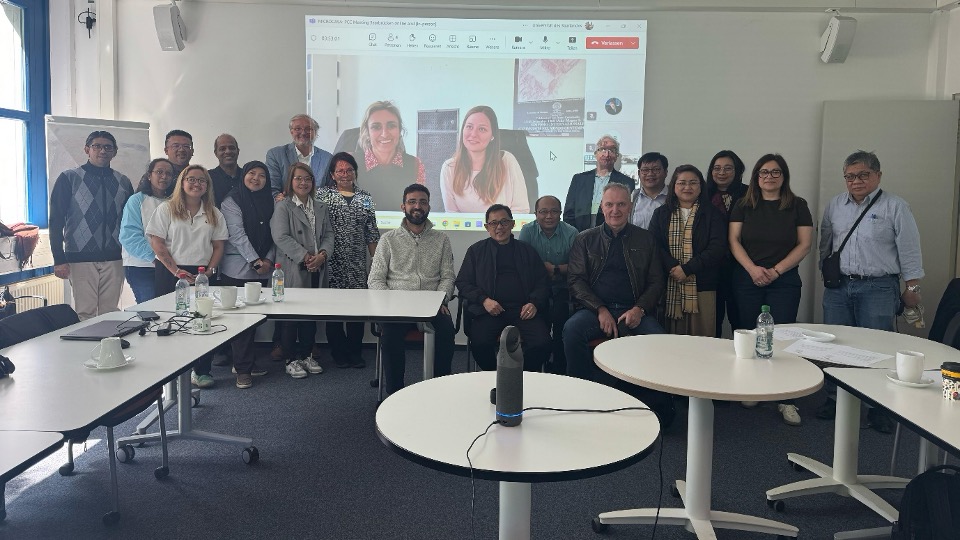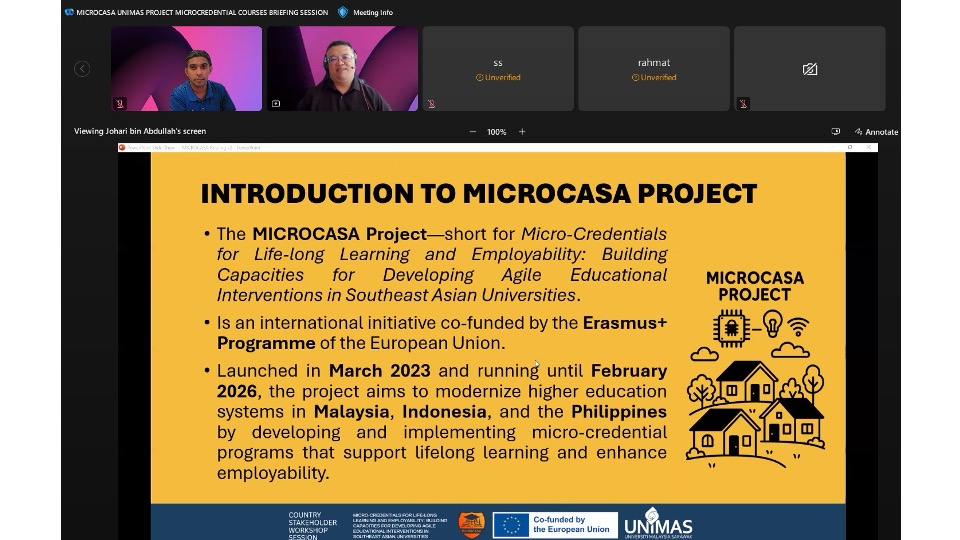
As higher education institutions across the globe transition toward more agile and skills-based learning, Universiti Malaysia Sarawak (UNIMAS) continues to lead the way through its involvement in the MICROCASA project, Micro-Credentials for Lifelong Learning and Employability. Supported by the European Union under the Erasmus+ programme, MICROCASA aims to strengthen the capacity of Southeast Asian universities in developing modular, stackable courses that address emerging skill gaps.
The MICROCASA initiative addresses every stage of micro-credential development, from collaboratively designing course content to adopting advanced educational technologies, establishing transparent quality assurance processes, and implementing secure systems for issuing and verifying digital credentials. By building these capacities, MICROCASA aims to make education more flexible, accessible, and closely aligned with evolving workforce demands.
The project’s consortium comprises 11 partners from Europe and Southeast Asia. On the European side, three universities contribute complementary expertise in curriculum design, digital learning, and credentialing: Saarland University (Germany), Universidad Carlos III de Madrid (Spain), and Università Europea di Roma (Italy). They are joined by Italy’s NARIC Agency—Centro di Informazione sulla Mobilità e le Equivalenze Accademiche—which specializes in qualifications recognition, as well as a dedicated quality assurance consultancy.
Representing Southeast Asia are six universities selected for their leadership and regional development roles: Universiti Sains Malaysia and Universiti Malaysia Sarawak (Malaysia), Universitas Brawijaya and Universitas Sam Ratulangi (Indonesia), and the University of the Philippines and Ateneo de Manila University (Philippines). This diverse group includes central, agenda-setting institutions alongside universities with strong local development missions, ensuring the project’s impact is both broad and meaningful. The UNIMAS team is led by Associate Professor Dr Johari bin Abdullah, with valuable support from Professor Dr Narayanan Kulathuramaiyer, Professor Dr Poline Bala, and Dr Mohamad Imran bin Bandan.
Within this broader effort, UNIMAS plays a pivotal role in adapting and contextualizing microcredential offerings to meet Malaysia’s evolving digital and socio-economic needs.

On 27 May 2025, UNIMAS hosted a comprehensive institutional stakeholder briefing to introduce its newly co-developed microcredential tracks under the MICROCASA initiative. The online session, conducted via the Webex platform, attracted a strong turnout of 111 participants comprising academic staff, administrators, instructional designers, and external collaborators. The primary objective of this session was to build awareness around the MICROCASA framework, present UNIMAS’s microcredential offerings, and gather feedback from internal stakeholders to ensure institutional readiness for implementation and scaling.
The event showcased two microcredential learning tracks specifically tailored to meet regional needs: one focusing on community engagement, and the other on innovative problem-solving using the TRIZ methodology. Each track comprises three modules designed to be completed in sequence, with participants earning digital badges and certificates upon completion. These tracks reflect the university’s vision for transdisciplinary and learner-centered course delivery, with strong relevance to sectors such as civil service, education, community development, and grassroots innovation.
Participant feedback indicated a strong endorsement of the initiative. Over 90 percent of respondents reported that the session improved their understanding of microcredentials and affirmed the relevance of the co-designed course content. A significant majority found the hybrid delivery model, combining flexibility with structured learning, both adaptable and appropriate for their respective domains. The CoDe-Graph framework, which underpins the course design process, was particularly well-received, with participants appreciating its emphasis on practical, problem-solving approaches that integrate community contexts and real-world applications.
The open-ended responses further revealed a high level of engagement, with participants highlighting the importance of providing toolkits, sample assessments, and clearer guidelines for integrating microcredentials into faculty planning. There was also a call for capacity-building efforts to support course developers, especially those new to digital credentialing and modular curriculum design. While the majority praised the session’s clarity and pacing, a few comments pointed to the need for simpler terminology and more illustrative case examples in future sessions.
This event also provided valuable strategic insights. It underscored the importance of aligning microcredential development with institutional goals and national digital policy agendas. Feedback from the session suggested that formalizing academic recognition pathways for microcredentials, such as elective credit conversion or integration into existing programmes, will be vital for sustained adoption. Equally important is the strengthening of digital learning infrastructure, with integration into the CFlex platform and UNIMAS’s learning management systems playing a central role in delivery. The session also highlighted the potential for industry collaboration in co-certifying certain modules, thereby enhancing the employability value of the microcredentials offered.
Moving forward, UNIMAS aims to leverage the momentum generated by this successful session to initiate pilot offerings of the two microcredential tracks. Plans are underway to conduct follow-up training and capacity-building workshops to ensure that course developers and academic teams are fully equipped for delivery. The interest expressed by a majority of attendees, particularly in the TRIZ-based innovation modules, suggests a fertile environment for cross-faculty and cross-sectoral collaboration.
In conclusion, the MICROCASA stakeholder briefing at UNIMAS marked a significant milestone in the university’s journey toward educational innovation and flexible learning. It reinforced the growing recognition that microcredentials can serve not only as tools for academic enrichment, but also as strategic enablers of workforce readiness and community empowerment. With the foundations now firmly in place, UNIMAS is well-positioned to scale its microcredential offerings and contribute meaningfully to the national agenda for lifelong learning and inclusive digital transformation.
For more information about MICROCASA project, please visit the project website at https://microcasa.uc3m.es